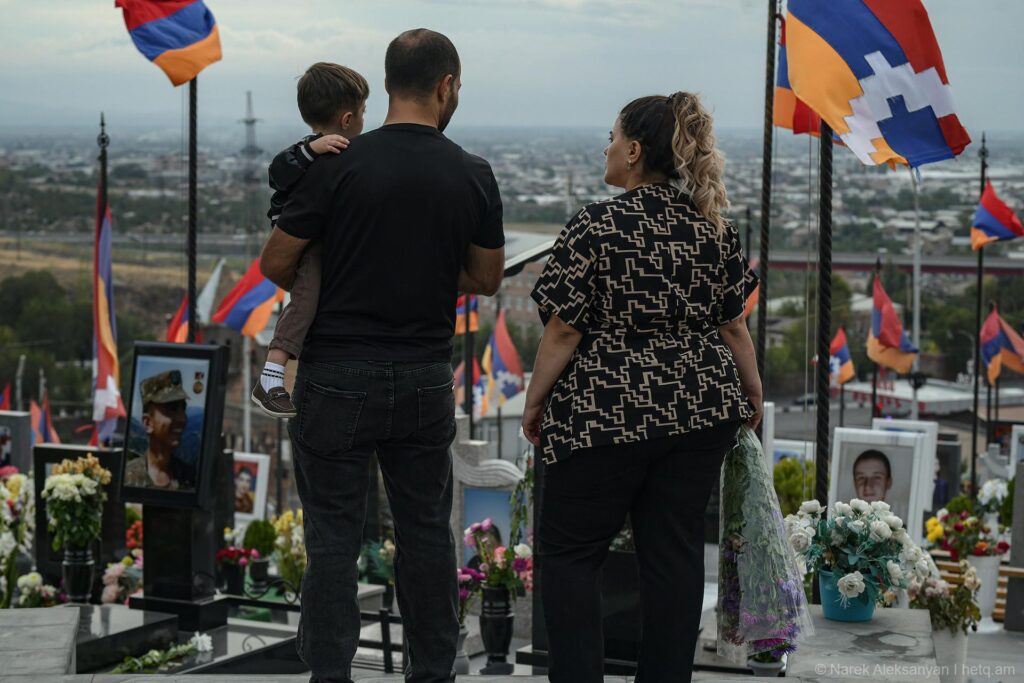Thursday marked the first anniversary of Azerbaijan’s assault on Nagorno-Karabakh, resulting in the mass exodus of the region’s Armenian population. As Armenians mourn the dissolution of Nagorno-Karabakh, Azerbaijan continues efforts to settle the region.
On Thursday, former Nagorno-Karabakh President Samvel Shahramanyan, and the former deputy chair of the region’s parliament, Gagik Baghunts, visited the Yerablur military cemetery in Yerevan to pay tribute to the memory of the victims of the Nagorno-Karabakh conflict.
Armenian Prime Minister Nikol Pashinyan has not issued a statement to commemorate Azerbaijan’s assault on Nagorno-Karabakh and the subsequent dissolution of the government in Stepanakert (Khankendi).
However, Armenia’s Foreign Ministry called the displacement of Armenians from the region the ‘last stage of the ethnic cleansing policy’, stating that they expect a ‘clear demonstration of political will and commitment to the peace agenda from other actors interested in the same goal.’
Baku swiftly criticised the Armenian Foreign Ministry statement, with the spokesperson of its own Foreign Ministry, Aykhan Hajizada, stating that the region’s Armenian population made a ‘free choice’ to leave Nagorno-Karabakh.
Azerbaijan also criticised the US Congress for holding a Human Rights Committee session on reports of human rights violations perpetrated by Azerbaijan against Armenians since Nagorno-Karabakh’s surrender, and Baku’s imprisonment of government critics.
Baku said that the US Congress hearing ‘openly distorts and falsifies all the facts related to Azerbaijan and is aimed at deteriorating Azerbaijan–US relations’.
On Thursday, former Nagorno-Karabakh Human Rights Defenders Artak Beglaryan and Gegham Stepanyan announced that they had filed a case at the International Criminal Court against Azerbaijan for crimes against humanity committed against Armenians in Nagorno-Karabakh.
Aliyev visits Stepanakert
As Armenians commemorated the dissolution of Nagorno-Karabakh, Azerbaijani President Ilham Aliyev visited Stepanakert, where he inspected ongoing work being carried out on buildings formerly associated with the Nagorno-Karabakh administration.
He also visited the ongoing construction site of a hotel that is expected to provide 50 jobs, and a business centre with restaurants and conference halls that will also serve as a hotel.
He signed a decree declaring 20 September State Sovereignty Day.
Aliyev also took part in the opening ceremony of Khankendi University, formerly Artsakh University.
While the number of students enrolled at the university is unknown, Aliyev also attended an opening ceremony for a dormitory with a capacity of 1,200 students while at the university.
He also attended the opening of a nursery and a secondary school. Pro-government media reported that the kindergarten will receive 80 children, while the school was preparing to receive 624 students.
Azerbaijan has not issued any statistics on the current Azerbaijani population of Nagorno-Karabakh or its efforts to settle territories that came under its control following September 2023.
Its assault on Nagorno-Karabakh on 19 September 2023 led to the region’s surrender the following day, and the eventual exodus of its entire Armenian population to Armenia.
[Read more: The last bus out of Nagorno-Karabakh]
Nagorno-Karabakh is believed to be largely deserted, with Nagorno-Karabakh’s former Human Rights Defender Gegham Stepanyan claiming that only 14 Armenians remain in the region as of September.
‘Even the people who once had some hope that they could stay and live in Azerbaijan eventually came to the conviction that it is impossible and turned to the Red Cross to move them to the Republic of Armenia. This is another indicator and this should also show that it is impossible to live there,’ said Stepanyan.
For ease of reading, we choose not to use qualifiers such as ‘de facto’, ‘unrecognised’, or ‘partially recognised’ when discussing institutions or political positions within Abkhazia, Nagorno-Karabakh, and South Ossetia. This does not imply a position on their status.




 20 September 2024
20 September 2024



